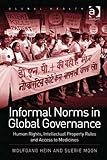Informal Norms in Global Governance : Human Rights, Intellectual Property Rules and Access to Medicines.
Material type: TextSeries: Global Health SerPublisher: Surrey : Routledge, 2013Copyright date: ©2013Edition: 1st edDescription: 1 online resource (260 pages)Content type: text Media type: computer Carrier type: online resourceISBN: 9781409426349Subject(s): Drugs -- Prices -- Developing countries | Foreign trade regulation -- Developing countries | Patents (International law) | Public health -- International cooperation | Right to health -- Developing countriesGenre/Form: Electronic books.Additional physical formats: Print version:: Informal Norms in Global Governance : Human Rights, Intellectual Property Rules and Access to MedicinesDDC classification: 362.1 LOC classification: RA441 -- .H45 2013ebOnline resources: Click to View
TextSeries: Global Health SerPublisher: Surrey : Routledge, 2013Copyright date: ©2013Edition: 1st edDescription: 1 online resource (260 pages)Content type: text Media type: computer Carrier type: online resourceISBN: 9781409426349Subject(s): Drugs -- Prices -- Developing countries | Foreign trade regulation -- Developing countries | Patents (International law) | Public health -- International cooperation | Right to health -- Developing countriesGenre/Form: Electronic books.Additional physical formats: Print version:: Informal Norms in Global Governance : Human Rights, Intellectual Property Rules and Access to MedicinesDDC classification: 362.1 LOC classification: RA441 -- .H45 2013ebOnline resources: Click to View Intro -- Contents -- List of Figures and Tables -- Foreword -- Preface -- List of Abbreviations -- Chapter 1 Introduction -- Chapter 2 Towards a Global Society -- Chapter 3 Access to Medicines: A Matter of Human Rights -- Chapter 4 Access to Medicines and Intellectual Property -- Chapter 5 The HIV/AIDS Crisis: The Rise of the Access Norm -- Chapter 6 Beyond HIV in Africa: Solidification and Expansion of the Access Norm -- Chapter 7 Challenges to the Stability of Informal Norms -- Chapter 8 Re-framing the Access Norm: Incorporating Innovation -- Chapter 9 The Impact of Non-state Actors on Informal Norms: Nodal Governance and Global Democracy -- Chapter 10 Conclusions -- Annex 1 The 2001 WTO Doha Declaration on TRIPS and Public Health -- Annex 2 Timeline of Key Events -- References -- Index.
Hein and Moon take up a serious problem of contemporary global governance: what can be done when international trade rules prevent the realization of basic human rights? Starting in the 1990s, intellectual property obligations in trade agreements required many developing countries to begin granting medicines patents, which often rendered lifesaving drugs unaffordable. At stake was the question of what priority would be given to health-particularly of some of the world's poorest people-and what priority to economic interests, particularly those of the most powerful states and firms. This book recounts the remarkable story of the access to medicines movement. The authors offer an explanation for how the informal, but powerful norm that every person should have access to essential medicines emerged after a decade of heated political contestation and against long odds. They also explore the stability and scope of the norm. Finally, the book examines the limitations of informal norms for protecting human rights, and when renewed focus on changing formal norms is warranted.
Description based on publisher supplied metadata and other sources.
Electronic reproduction. Ann Arbor, Michigan : ProQuest Ebook Central, 2018. Available via World Wide Web. Access may be limited to ProQuest Ebook Central affiliated libraries.

There are no comments on this title.